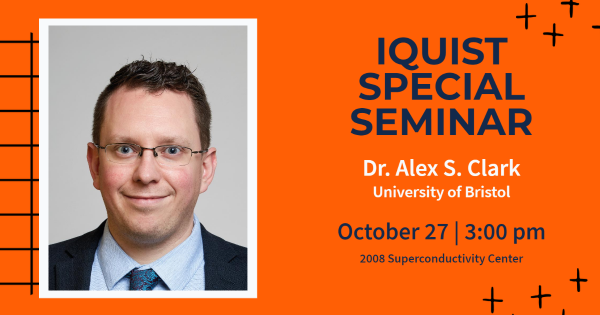
IQUIST Special Seminar: "Molecular Quantum Photonics," presented by Dr. Alex S. Clark, University of Bristol
- Event Type
- Ceremony/Service
- Sponsor
- Illinois Quantum Information Science and Technology Center
- Location
- 2008 Superconductivity Center
- Date
- Oct 27, 2022 3:00 - 3:50 pm
- Speaker
- Dr. Alex S. Clark, Quantum Engineering Technology Labs, University of Bristol
- Contact
- Hannah Stites
- hstites2@illinois.edu
- Phone
- 217-300-4072
- Views
- 40
- Originating Calendar
- IQUIST Events Calendar
Molecular Quantum Photonics
Abstract: Single organic molecules have recently seen increased interest for use as single photon sources [1]. They emit photons with high efficiency and at favourable wavelengths for coupling to other quantum systems, such as alkali atoms [2]. I will present our recent work on growing various mixed molecular crystals [3,4] which show promise for interfacing with rubidium and potassium atoms. I will discuss methods that can be used to tune molecule emission via both applied electric fields and the application of strain [5]. We have recently shown that subsequent photons emitted by a single molecule can undergo quantum interference at a beam splitter [6], which is a useful tool in optical quantum computing and communication. I will discuss how the indistinguishability of photons can not only be ascertained employing pulsed excitation, which is commonly carried out for single quantum emitters, but can also be found via continuous wave excitation as long as measurements are carried out at more than one excitation power. While the excitation of molecules and their subsequent radiative emission is efficient [7], the generated photons can be difficult to collect. There is therefore a large amount of ongoing work on coupling organic molecules to nanophotonic structures to modify their emission [1]. The simplest photonic structure one can imagine is an integrated optical waveguide. I will discuss methods to deposit and evanescently couple molecules to waveguides, and present a hybrid plasmonic structure that has shown recent promise [8]. Evanescent coupling has limitations as the molecules cannot sit at the maximum of the vacuum electric field of the waveguide. I will present our recent work on coupling molecules to interrupted waveguides using on chip micro-capillaries [9]. Finally, I will discuss our future plans to enhance this coupling through the use of nanophotonic cavities.
[1] C. Toninelli et al., Nature Materials 20, 1615-1628 (2021).
[2] P. Siyushev et al., Nature 509, 66-70 (2014).
[3] R. C. Schofield et al., Optical Materials Express 10, 1586-1596 (2020).
[4] R. C. Schofield et al., ChemPhysChem 23, e202100809 (2022).
[5] A. Fasoulakis et al., submitted (2022).
[6] R. C. Schofield et al., Phys. Rev. Research 4, 013037 (2022).
[7] P. Ren et al., Chinese Physics Letters 20, 073602 (2022).
[8] S. Grandi et al., APL Photonics 4, 086101 (2019).
[9] S. Boissier et al., Nature Commun. 12, 706 (2021).
Bio: Dr Alex S. Clark is a Senior Lecturer and Royal Society University Research Fellow in the Quantum Engineering Technology Labs at the University of Bristol. He received an MSci Degree in Physics and PhD degree in quantum photonics from the University of Bristol, UK. During his PhD he developed photonic crystal fibres to generate photons in a variety of quantum states, demonstrated a quantum controlled-NOT gate in optical fibre and created multi-qubit cluster states using fibre devices. In 2011 he joined the Centre for Ultrahigh-bandwidth Devices for Optical Systems (CUDOS) group at the University of Sydney and was Project Leader of the Quantum Integrated Photonics Project. Whilst there he won a Discovery Early Career Researcher Award, a three-year fellowship to work on integrated quantum frequency conversion. In 2015 he won a Marie Skłodowska Curie Research Fellowship to work in the Centre for Cold Matter at Imperial College London, leading a group of researchers working on the use of organic dye molecules to build photon sources and other enhanced quantum technology. In 2017 he was awarded a prestigious Royal Society University Research Fellowship to pioneer a new field of Molecular Quantum Photonics. In 2021 he was appointed as a Senior Lecturer in Quantum Communication Technology in the Quantum Engineering Technology Labs at the University of Bristol, based in the Department of Electrical and Electronic Engineering. He is Chair of the IOP Quantum Optics, Quantum Information, and Quantum Control (QQQ) Group and Programme Chair for the IOP Photon Conference.
Homepage: http://www.bristol.ac.uk/qet-labs/research/clark-group/
Twitter: https://twitter.com/DrAlexClark